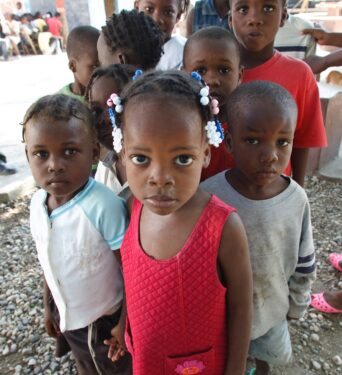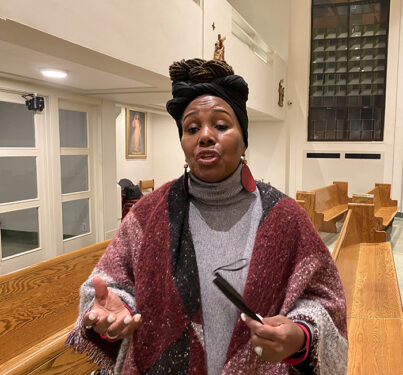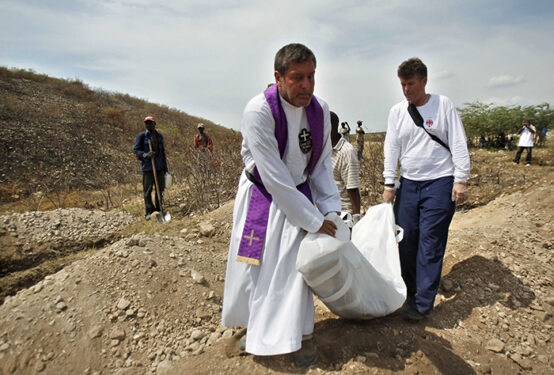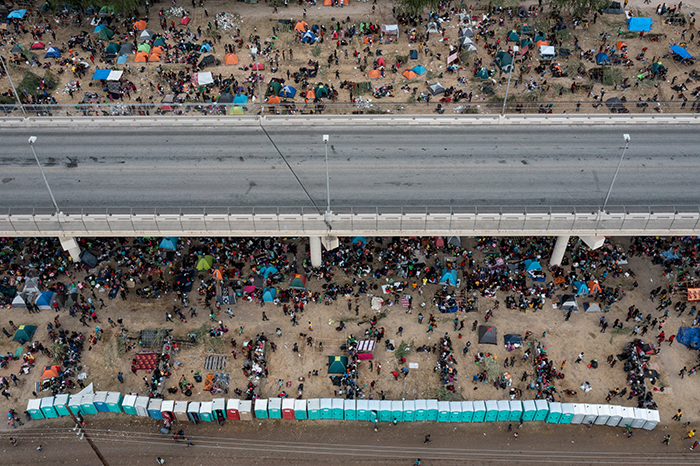
‘The World Reached Out, the World Was Generous, But That Did Not Reach Haiti’
CAMBRIA HEIGHTS — Late last summer, tens of thousands of Haitian migrants surged across the Texas-Mexico border, fleeing the ravages of a devastating earthquake back home and seeking refuge in the U.S.
An estimated 30,000 of them huddled in encampments beneath the International Bridge at Del Rio, Texas. But most had not been displaced by the recent 7.2-magnitude quake, Aug. 14, 2021, on the western portion of Haiti.
Their plight began 12 years ago, on Jan. 12, in the aftermath of the slightly smaller, but much deadlier, 7.0-magnitude earthquake, centered near the nation’s capital, Port-au-Prince.
In the 2021 quake, 2,050 lives were lost in Haiti’s mostly rural Tiburon Peninsula.
But in 2010, an estimated 300,000 died in and around the densely populated urban capital.
Haitian Catholics in the Diocese of Brooklyn believe that the disaster in 2010 created a leadership void that has given way to widespread political corruption, lawlessness, and violence in the streets and countryside ever since.
“What happened to Haiti on Jan. 12, 2010, is a catalyst for everything that has happened since,” said Elsie Saint Louis, who leads Haitian Americans United for Progress (HAUP), based in Hollis, Queens.
“We lost 300,000-plus people,” she said. “It weakened all of our institutions. It weakened our government. It weakened our churches. We lost everything.”
Lamentations
Saint Louis was among a few dozen Catholics who attended a special evening Mass on Jan. 12 to honor the lives lost in 2010. It was held at Sacred Heart Parish Church in Cambria Heights, Queens, which is her parish.

The celebrant was Father Hilaire Belizaire, the pastor, who is also the director of the diocese’s Haitian Apostolate. Concelebrant was Father Daniel O. Kingsley, administrator of St. Clare Parish in Rosedale, Queens.
Father Kingsley’s mother is from Haiti, so he has a deep connection to the nation’s people, their culture, and the plights they endure. Father Kingsley, who was a seminarian in the Diocese of Brooklyn at the time, shared his memories of Jan. 12, 2010, a day of solemnity for Haitians everywhere.
“I remember being in the dentist’s office,” he recalled. “I was minding my own business, and I saw a woman who just got off the phone. She started screaming and yelling. She probably received the worst news of her life.
“It was shocking. What do you do when someone has received the worst news?”
Father Belizaire also shared his memories of that day and what he, and other Haitians in the U.S., felt — “numbness, helplessness, powerlessness, and hopelessness.”
“I can vividly recall that period of time when I was waiting for a sign, a phone call from my loved ones whom I had not heard from in days,” he said. “The pain became more agonizing.”
Eventually, hope replaced despair as Catholics turned to their faith and channeled their emotions into relief efforts.

Father Belizaire tells a story about how, while performing missionary work in Haiti following the 2010 quake, he was at the ruins of the Sacred Heart Church in Turgeau, where only a large crucifix remained standing. A TV reporter on the scene asked, on camera: “Where was God in all this?”
“An old lady who was close by overheard him and pointed her finger toward the crucifix,” Father Belizaire recalled. “ ‘Here,’ she said. ‘He is — here in the midst of our suffering.’ ”
“Christian faith does not mean believing in impossible things,” Father Belizaire said. “Faith is not hoping the worst won’t happen. It is knowing that there is no tragedy which cannot be redeemed.”
Hope Beset by Crises
Saint Louis said disaster is nothing new to the Caribbean island nation where she was born.
But the ones following 2010 have only made things worse, like Hurricane Matthew in 2016. Last year, Tropical Depression Grace hampered rescue and recovery efforts in the aftermath of the Aug. 14 earthquake. There have been mudslides and floods.
Following all the disasters, sympathetic nations responded with relief supplies and lots of cash, but much of it has been pillaged via political corruption and lawlessness, Saint Louis said.
Roving gangs routinely hijack relief-supply convoys and commit kidnappings for ransom, including the well-publicized recent abduction of a group of U.S.-based missionaries.
“Yes,” she continued, “the world reached out; the world was generous. But all that generosity did not reach Haiti. So it did not help Haiti rebuild. Which brings us again now to this migrant crisis.”
COVID Exacerbates Problems
The COVID-19 pandemic provided even more turmoil for Haiti.
Last year, the government led by President Jovenel Moïse delayed accepting 130,000 doses of the AstraZeneca vaccine made in India following reports that in rare cases, the vaccine may cause blood clots. When officials in Haiti finally decided to send for the medicine, they were told the doses couldn’t be spared because a sudden COVID-19 surge in India had reached alarming levels.
By the end of May, Haiti experienced its own jump in COVID-19 cases. The nation’s supreme court chief justice, René Sylvestre, died of the disease in June. Anxiety grew in early July as Haiti was plunged into more chaos with the assassination of President Moïse.
Finally, in late August, just a couple of weeks after the latest earthquake, Haiti started getting shipments of the Moderna vaccine from the U.S., but many people refused them out of distrust of their government, according to reports.
Although deaths have remained low, as of Jan. 14, Haiti is the fourth-least vaccinated country in the world with 0.7% of the population fully vaccinated, reported The Multilateral Leaders Task Force on COVID, which is a group that tracks and monitors specific global and country-level gaps in vaccine distribution.
An 11-Country Journey
Saint Louis’s organization, HAUP, helps migrants navigate the process of getting their papers in order to be in the U.S. legally. For many, it’s a long process, added to the heap of struggles they’ve faced over the past 12 years.
“They immigrated to South America because they had nowhere to go from Haiti,” Saint Louis said. “They were fine in Chile, but they had to migrate again because … of COVID.”
The migrants rushed across Central America and Mexico to the U.S. border because, according to reports, they were led to believe, erroneously, that the U.S. had opened its doors to them.
“They’ve been through a lot,” Saint Louis said. “These people walked through 11 countries to get here.”
Immigration officials cleared the camps beneath the International Bridge at Del Rio. Many were deported, some remain in detention centers, but others have been allowed to continue their journeys into the U.S.
A few thousand have already reached Brooklyn and Queens, providing lots of work for HAUP and other groups. Saint Louis urged New Yorkers to learn the stories of these migrants and to share them with elected officials here. She also appealed for financial support for “Haitian-led and Haitian-serving community-based organizations.”
She recounted how in September, she joined a delegation going to Texas from the diocese to meet the recently arrived Haitian refugees. The goal was to assess their needs to determine how they could be helped in New York.
The group included HAUP, Catholic Charities, and the Haitian Apostolate, represented by Father Belizaire, who was born in Cap-Haitien, Haiti.
Before the delegation was about to board flights back to New York, it made a detour upon learning of two busloads of Haitian migrants that had just arrived at a temporary holding facility in Houston.
“They were not told where they were going when they got off the bus,” Saint Louis said. “They didn’t know if they were going to be transferred or if they were going to be taken to the plane. But then they saw a man in a collar — Father Hilaire — who spoke their language.
“And I remember the cries of joy when father told them, ‘You’re here; you’re not going to prison, you’re not being returned. You are safe.’ ”

